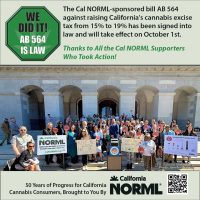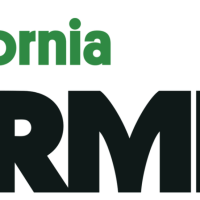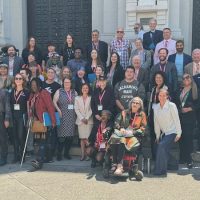 January 1, 2017 – Prop. 64 inadvertently failed to spell out any penalty for smoking or using marijuana while driving, although it did state this was not legal (HSC 11362.3(a)7), and explicitly make possession of an open container of marijuana in a vehicle an infraction (HSC 11362.4(b) & 11362.3(a)4).
January 1, 2017 – Prop. 64 inadvertently failed to spell out any penalty for smoking or using marijuana while driving, although it did state this was not legal (HSC 11362.3(a)7), and explicitly make possession of an open container of marijuana in a vehicle an infraction (HSC 11362.4(b) & 11362.3(a)4).
Now, Senator Jerry Hill (San Mateo) & Asm Evan Low (San Jose) have stepped into the gap by proposing that smoking while driving explicitly be made a woblette, or alternative misdemeanor or infraction with their bill SB 65. The alternative criminal misdemeanor represents an INCREASE in the penalty for smoking while driving, which prior to 64 was always punished as an infraction (VC 23222(b) – possession of MJ while driving). This violates the spirit of Prop 64 and will at a minimum require a 2/3 majority vote.
Under Prop. 64, the legislature may amend certain sections by a two-thirds vote, but only “to further the purposes and intent of the Act.” Increasing the penalty for use while driving is not mentioned in the initiative’s Purpose and Intent. The closest reference in Section 3 of Prop. 64 is Paragraph (p), which states its intent is to: “Maintain existing laws making it unlawful to operate a car . . . while impaired by marijuana.” Increasing a penalty is inconsistent with maintaining an existing law.
For the sake of apparent consistency, Sen. Hill is also proposing that the penalty for drinking while driving also be increased from an infraction to a woblette – although alcohol is actually more dangerous than marijuana behind the wheel.
Nonetheless, there is no evident need for stiffer penalties for using while driving. Callifornia’s accident rate has been declining for years, as have DUI offenses. Sen. Hill should be told to drop the misdemeanor penalties from his bill.
(Note that smoking while driving is different from driving under the influence, which is a criminal offense but requires proof of impairment.)
See release about Hill-Low bill.
ORAL SWAB TESTING BILL RE-INTRODUCED
In addition, a bill allowing for the collection of oral fluids from drivers suspected of impairment from marijuana has been reintroduced (AB 6, Lackey).
Oral fluid testing is still not a proven technology. The federal government’s lead researcher on the topic of marijuana and driving, Marilyn Heustis, wrote recently:
There is growing interest in correlating the subjective effects of cannabis directly to OF [oral fluid] THC concentrations, due to OF advantages as a sampling matrix. However, our results indicate caution in interpreting effects from OF concentrations. Unlike blood models, OF regression models (full time course, Supplemental Table 3) had low b-values even when main effects or interactions were statistically significant, probably due to high inter-individual variability in OF THC concentrations and a time course influenced by OF oral contamination rather than systemic cannabinoid concentrations….Overall, OF THC concentrations were not reliable indices of blood and plasma THC concentration, accounting for the former’s weak association with subjective effects.
If the bill passes, it will be just one more piece of evidence used in a DUID case, like the more invasive blood test currently being used. Pilot tests in LA and elsewhere indicate that drivers are more likely to plead guilty if their oral test is positive, and Cal NORML has concerns that those who cannot afford legal representation could be pressured to plead guilty by public defenders. We would also not like to see oral swabs used at traffic checkpoints.
As with workplace drug testing, the better method to use is impairment testing. One App that can be downloaded on phones to test for impairment that is recommended by NORML is My Canary.
AUMA/MCRSA RECONCILIATION BILL
Assemblyman Bonta and the other authors of MCRSA, the medical marijuana law that passed in 2015, have introduced AB 64, aiming at reconciling AUMA (Prop. 64) with the regulations in MCRSA. So far, the bill has restrictions on advertising by licensees and allows for licensing of delivery services.
EDIBLE LABELING AND INSPECTION BILL
Assemblyman Ed Chau (D-Monterey Park) has introduced a bill that would require a state agency to inspect the labeling of any edible pot product to make sure it is not attracting children and inspect its packaging to make sure it is child-resistant.
The bill seems unnecessary, as this is already covered by Prop. 64:
AUMA Sec 26130:
(a) Prior to delivery or sale at a retailer, marijuana and marijuana products shall be labeled and placed in a resealable, child resistant package.
(b) Packages and labels shall not be made to be attractive to children.
BOE BILL
Freshman Senators Scott Wiener of San Francisco and San Diego’s Toni Atkins (the former Speaker of the Assembly) have introduced SB 148 allowing for cities and counties to collect cash payment from marijuana businesses. The bill has the support of BOE chair Fiona Ma and the California Grower’s Association.
An effort lead by California State Treasurer John Chiang seeks to open up banking to cannabis businesses.
PROTECTING TERROIR
SB 175 (McGuire) would prohibit marijuana businesses from using both the name of a California county or any name that appears similar to it unless their cannabis is produced in that county.
NON UNION BILL
AB 238 (Steinorth) would make it illegal for anyone with a state license to distribute marijuana to turn someone down for a job because they aren’t part of a union. The bill also states entrepreneurs applying for a business license can’t be denied simply because they employ people who aren’t unionized.
Marijuana Edibles
AB 350 (Salas) would specify that a marijuana product is deemed to be appealing to children or easily confused with commercially sold candy if it is in the shape of a person, animal, insect, fruit, or in another shape normally associated with candy, but would not prohibit a licensee from making an edible marijuana product in the shape of the licensee’s logo.
Forestry Assistance Programs
AB 362 (Wood) limits the amount of money that can be loaned to the Department of Fish and Wildlife for activities to address environmental damage occurring on forest lands resulting from cannabis cultivation to $500,000, until July 1, 2017 (the end of the current fiscal year).
Drug and Alcohol Free Residences
AB 285 (Melendez) would authorize a drug and alcohol free residence to demonstrate its commitment to providing a supportive recovery environment by applying and becoming certified by an approved certifying organization that is approved by the State Department of Health Care Services. It defines a drug and alcohol free residence as one where, “Owners, managers, operators, and residents observe and promote a zero tolerance policy regarding the consumption or possession of alcohol or controlled substances or marijuana being used in any manner not consistent with a documented prescription.”
Water Fees
AB 313 (Gray) amends section 1525 of the Water Code (containing cannabis provisions and others) to say: “This section shall become inoperative on July 1, 2018, and, as of January 1, 2019, is repealed.”
Consumer guidance
AB 389 (Salas, Caballero, and Ridley-Thomas) would require the bureau, by July 1, 2018, to establish and make available on its Internet Web site a consumer guide to educate the public on the regulation of medical and nonmedical marijuana. The guide shall include, without limitation: (1) The difference between medical cannabis and nonmedical cannabis; (2) Where nonmedical cannabis may be legally purchased; (3) Rules on the public consumption of medical cannabis and nonmedical cannabis; (4) How much cannabis may be purchased at one time; (5) Penalties for violating cannabis laws; and (6) The process for reporting consumer concerns or complaints.
CBD intent
AB 416 (Mathis) would “state the intent of the Legislature to enact legislation relating to CBD-enriched cannabis.”
License disclosure
AB 420 (Wood) would require an advertisement for the sale of medical cannabis or medical cannabis products to identify, at a minimum, the license number of the MCRSA or AUMA licensee.



